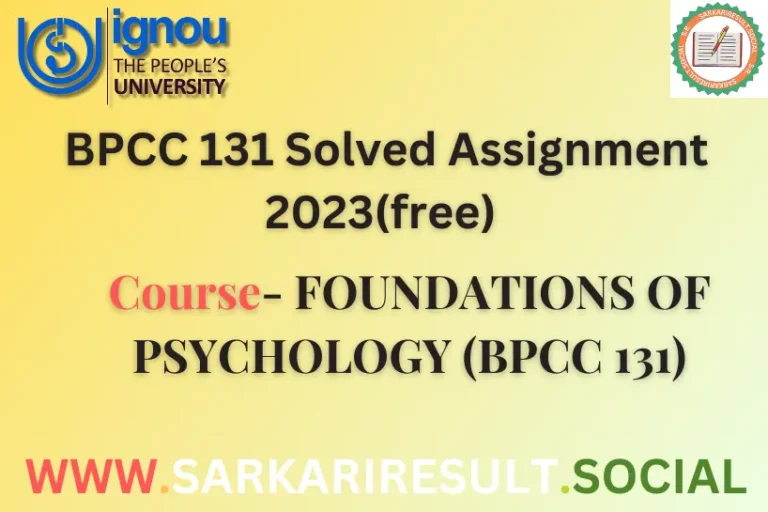BPSC 133 SOLVED IGNOU ASSIGNMENT FREE PART 1

Welcome to the BPSC 133 SOLVED IGNOU ASSIGNMENT FREE PART 1 TMA. Assignment – I features two comprehensive questions. In about 500 words each, describe the important methods of comparison in the study of political science and discuss the different types of functions performed by political parties in democratic systems. Our concise responses provide a clear and efficient path for comprehending these critical aspects of comparative government and politics, ensuring a successful completion of your assignments.

Answer the following in about 500 words each. Each question carries 20 marks.
Q.1 Describe the important methods of comparison in the study of political science.
Ans. In the study of political science, comparison is a fundamental method employed to analyze political systems, institutions, behaviors, and processes across different contexts. Various methods of comparison provide insights into understanding the similarities and differences between political phenomena. Here are some important methods of comparison in political science:
1. Cross-National Comparison:
– Definition: This involves comparing political phenomena across different nations.
– Purpose: Understand how political systems and institutions vary or converge globally.
– Example: Comparative analysis of electoral systems in the United States and India.
2. Cross-Temporal Comparison:
– Definition: Examining political phenomena over different time periods.
– Purpose: Identify patterns, changes, or continuity in political processes over time.
– Example: Studying the evolution of voting behavior in a country over several decades.
3. Case Study Method:
– Definition: In-depth examination of a specific political case or phenomenon.
– Purpose: Provide detailed insights into a particular context, allowing for rich, nuanced analysis.
– Example: Analyzing the impact of a specific policy in a single country.
4. Controlled Comparison:
– Definition: Systematically selecting cases with shared characteristics and comparing them with cases that differ in certain aspects.
– Purpose: Isolate variables to identify causal relationships and patterns.
– Example: Comparing democracies and authoritarian regimes with similar economic conditions.
5. Comparative Historical Analysis:
– Definition: Analyzing historical events or periods to understand political phenomena.
– Purpose: Explore how historical context shapes political outcomes.
– Example: Studying the impact of colonial history on post-colonial political institutions.
6. Small-N Comparative Analysis:
– Definition: Comparing a small number of cases in-depth.
– Purpose: Allows for detailed examination of specific cases, often useful for theory-building.
– Example: Analyzing the political development of Scandinavian welfare states.
7. Large-N Comparative Analysis:
– Definition: Comparing a large number of cases to identify generalizable patterns.
– Purpose: Establish broad trends or relationships applicable to a larger population.
– Example: Studying the relationship between economic development and democratization across multiple countries.
8. Comparative Institutional Analysis:
– Definition: Analyzing political institutions across different settings.
– Purpose: Understand the impact of institutional design on political outcomes.
– Example: Comparing the parliamentary and presidential systems in democratic governance.
9. Comparative Policy Analysis:
– Definition: Examining the implementation and outcomes of policies across different political contexts.
– Purpose: Evaluate the effectiveness and adaptability of policies.
– Example: Analyzing healthcare policies in European countries to identify best practices.
10. Process-Tracing:
– Definition: Examining the causal mechanisms and sequences leading to a political outcome.
– Purpose: Understand the dynamic processes that shape political events.
– Example: Tracing the factors leading to the rise of populist movements in different regions.
These methods, when used in combination, offer a comprehensive understanding of political phenomena by considering different dimensions, contexts, and levels of analysis. Comparative political science provides valuable insights into the complexities of political systems and contributes to the development of theories and generalizable knowledge.
Q.2 Discuss the different type of functions performed by political parties in democratic systems.
Ans. Political parties play multifaceted roles in democratic systems, serving as crucial intermediaries between citizens and the government. Their functions extend beyond mere electoral competition; they shape the political landscape and contribute to the functioning of democratic governance. Here are different types of functions performed by political parties in democratic systems:
1. Representation:
– Definition: Parties represent the interests, values, and aspirations of different segments of society.
– Role: Articulating diverse perspectives ensures that a wide range of views is considered in the political process.
2. Aggregation of Interests:
– Definition: Parties aggregate various interests into cohesive platforms.
– Role: Through a process of compromise and negotiation, parties create policies that reflect the collective will of their supporters.
3. Political Socialization:
– Definition: Parties educate and socialize citizens about political issues and ideologies.
– Role: Facilitating civic engagement and fostering political awareness contribute to an informed electorate.
4. Recruitment of Leaders:
– Definition: Parties identify and nurture political talent.
– Role: They provide a platform for individuals to enter politics, contributing to a dynamic and diverse leadership.
5. Formulation of Policies:
– Definition: Parties develop policy agendas and platforms.
– Role: Articulating clear policy positions helps voters make informed choices and holds parties accountable for their promises.
6. Mobilization of Voters:
– Definition: Parties mobilize citizens to participate in the political process.
– Role: Encouraging voter turnout and engagement strengthens the democratic foundation.
7. Government Formation:
– Definition: In parliamentary systems, parties play a key role in forming governments.
– Role: Coalition-building or majority support determines the formation of a stable government.
8. Check and Balance:
– Definition: Opposition parties scrutinize the actions of the ruling party.
– Role: Holding the government accountable ensures transparency and prevents abuse of power.
9. Legislative Function:
– Definition: Parties operate within legislative bodies to pass laws.
– Role: Their strength and cohesion impact the legislative process and the effectiveness of governance.
10. Communication Channel:
– Definition: Parties serve as a channel for communication between citizens and the government.
– Role: Expressing public sentiment and grievances fosters responsiveness in governance.
11. Conflict Resolution:
– Definition: Parties offer a peaceful means for resolving societal conflicts.
– Role: Through negotiation and compromise, parties channel dissent into democratic processes.
12. Fostering Accountability:
– Definition: Parties contribute to the accountability of elected officials.
– Role: Regular elections and party discipline ensure that representatives are answerable to the electorate.
13. International Relations:
– Definition: Political parties engage in diplomatic relations and international affairs.
– Role: They contribute to foreign policy discussions and foster international cooperation.
14. Adaptation to Change:
– Definition: Parties evolve to address changing societal needs and values.
– Role: Adapting to shifts in public opinion and societal norms ensures relevance and longevity.
In summary, political parties are indispensable to the functioning of democratic systems, performing diverse functions that range from representation and policy formulation to fostering accountability and conflict resolution. Their effectiveness is pivotal in maintaining the vitality and responsiveness of democratic governance.
Also See This: BPSC 133 SOLVED IGNOU ASSIGNMENT FREE PART 2







